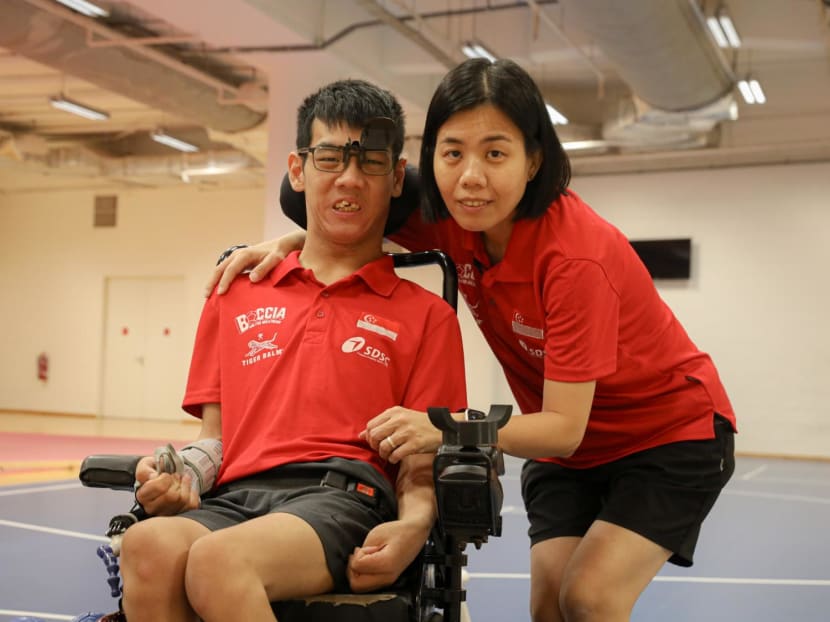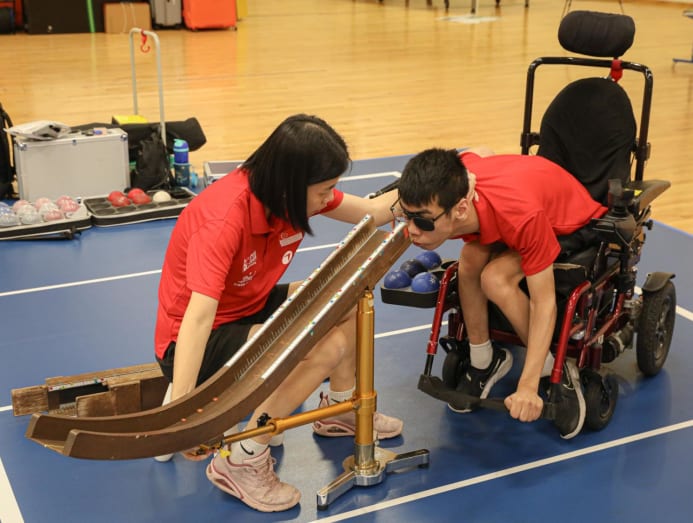The Stories Behind: How boccia gave a teen with cerebral palsy dreams of Paralympic gold and his family a way to bond

Singapore boccia para-athlete Aloysius Gan with his mother and competition partner Eve Cher at the Singapore Sports Hub on Aug 19, 2024. (Photo: CNA/Mak Jia Kee)
SINGAPORE — I still recall, during my teenage years, how an older family friend frequently confided in my mother about her worries of what the future holds for her daughter who has an intellectual disability.
I cannot forget the few times this family friend ended up in tears over the immense mental turmoil that only someone in her position can truly understand.
It is no surprise that caring for family members with physical or mental disabilities can exact an enormous toll on caregivers, as what my colleagues and I often found out over the course of our work as journalists, especially during the Covid-19 pandemic.
That was why before I met 18-year-old boccia para-athlete Aloysius Gan and his 44-year-old mother Eve Cher, I admit that I was weighed down by gloomy thoughts.
Aloysius has cerebral palsy, a condition that affects his ability to walk and speak.
However, when I met the duo during a boccia training session last month, I saw only two equal partners training together and sharing a singular goal of bettering themselves in the Paralympic sport.
They did this with an almost uninterrupted focus for about two hours.
When they finally took a break from training to speak to me, I was struck by Aloysius and his mother's upbeat outlook and cheery vibe, even though we touched on heavier topics such as caregiving and life outside of the sport.
It was their laughter and shared sense of humour during the interview that I remember most while writing this article.
And the family definitely has plenty of reasons to be cheerful, given that Aloysius has more than 20 boccia medals from national and international tournaments to date — no doubt a testament of his talent and determination, coupled with strong family support.
Most recently this year, he won his first silver at the World Boccia Cup and, together with his teammate Nurulasyiqah Mohd Taha, took home a bronze for the pair category — Singapore’s first pair medal at the competition.
The win was especially notable given that both of them won with a convincing 6-0 score against higher-ranked opponents.
Boccia is a Paralympic sport that closely resembles petanque or lawn bowling, in which players launch their balls towards a target ball or “jack”, scoring points by landing their ball closer to that of their opponents.
It was introduced into the Paralympics in 1984 and gained renewed attention in Singapore after boccia athlete Jeralyn Tan took home a silver medal — the nation’s first medal in the sport — from this year's Paris Paralympics in France.
‘GOOD’ TO CRY OVER BOCCIA
Before our interview began, Ms Cher helped to move her son from the electric wheelchair that he used during the boccia training to a lighter one that appeared to be easier to manoeuvre.
To me, that simple task seemed like an immense effort. To the duo, though, this was an everyday act that became their reality after Aloysius was first diagnosed with cerebral palsy. There was a delay during birth that caused damage to his brain.
For the first five to six years of his life, the family explored various therapies here and overseas to try to help Aloysius walk and speak. The progress was “minimal” compared to the effort put in, Ms Cher said.
“The result might not have been significant, but the feedback I received from most therapists was (that) he was very determined,” she added.
Inspired by their son’s determination, the Gans began to look at other ways to help Aloysius live a fulfilling life.
“Instead of focusing on how to make him able to walk and speak, (we thought about) how else can we help to make him 'a better him' despite his disability?
"That's why when we got to know boccia and found out that he was able to play this sport, we were hooked,” Ms Cher said.
Aloysius started playing boccia at seven years old after a teacher suggested it while he was studying at the Cerebral Palsy Alliance Singapore School.
Less than six months into the sport, the young boy took part in his first national competition in 2013.
He said: “We didn't have our own boccia ramp and set of balls when we competed in this competition because we just joined the CCA (co-curricular activity in school). We just borrowed from teammates who were not having matches at the same time.”
Aloysius was eventually eliminated from the competition and recalled bursting into tears as a result.
“I think I simply felt sad because, perhaps, it was the first ‘defeat’ in my life,” he said.
“(But) my CCA teacher mentioned that it was good that I cried, because it means that I have expectations for myself."
The teacher believed as well that Aloysius' strong reactions to the loss showed how determined he was, and was a promising sign that success was just around the corner, the teenager added.
HOW BOCCIA IS PLAYED
Boccia is only one of two Paralympic sports — the other sport being goalball — that do not have an equivalent event in the Olympics.
The game is played in a 12.5m by 6m court between two individuals, two pairs of players or two teams.
Each side is assigned either blue or red balls, and score points by bowling or releasing their respective coloured balls as close as they can to a white ball on the field called the “jack” ball.
Scoring is similar to petanque, but bouncier red or blue leather balls are used in boccia instead of grey steel balls.
The manner in which the balls are released differ depending on the para-athletes, who are sorted into four categories — from BC1 to BC4 — based on their abilities.
For Aloysius, who plays in the BC3 category, an assistant would help him place his boccia ball on a ramp according to his instructions. He would then push the ball to launch it.
The assistant is not allowed to observe the gameplay and have to back-face the field at all times. In other words, the athlete — in this case Aloysius — calls all the shots when it comes to strategy and gameplay.
‘HE’S THE BOSS’
Since Aloysius' parents are his competition partners, they are a constant feature at his training sessions, which happen four times a week.
Watching them train at the OCBC Arena, a sports complex at the Singapore Sports Hub, I saw mother and son working as equal partners, despite one being seated on a wheelchair and the other being up and about.
Ms Cher would help set up the ball on the ramp and Aloysius would launch the ball using either his head or a prong attached to his hand.
At times, it was Ms Cher who would suggest launching the angle or height of launch. On other occasions, it was Aloysius.
During competitions though, since the competition partner — in Aloysius’ case, either his mum or dad — is not allowed to look at the field, it means that Aloysius has complete control over the strategy, gameplay and decisions.
Ms Cher said: “At times during competition, when he gives us certain instructions, we would think, ‘Are you sure, this is the correct height or angle to put (the ball)?’
“But during competition, he’s the boss,” she added while beaming proudly at her son.
Asked if he enjoys the opportunity of "bossing" his parents, Aloysius let out a hearty laugh in agreement.
Ms Cher said that Aloysius has grown through the sport, both on the field and outside when they review matches and training sessions together.
“He would be able to contribute some (strategy) ideas that we don't even think of, so we can see that he is starting to learn from experience,” Ms Cher added.

HE'S A SWIFTIE
Off the field, Aloysius is no different from any typical teenager.
He enjoys listening to pop music during his free time and as it turns out, is a Swiftie — the name given to fans of American pop singer Taylor Swift.
“Her songs are nice and I went to her concert when she performed in Singapore this year,” he said excitedly.
In school, he counts infocomm technology as his favourite subject because it allows him to hone one of his favourite skills — video editing.
“I appreciate that with today’s technology, I can operate the computer using an assistive device, and I enjoyed applying different skills in the video editing software to create cool effects in my video,” the teenager said, adding that he hopes to find a job in video editing in the future.
For now, he has already set his sights on his next milestone in sports.
His training schedule has gone up from eight hours a week when he first started to 20 hours since joining the national team in 2019.
“My next goal is to qualify for the Paralympic Games, which is the dream for every athlete.”
Not once during the interview did Aloysius talk about his limitations. Instead, his ambition and his drive to succeed in the biggest sporting stage that the world could offer him was truly inspiring to me.
No surprise that because of his fervour for the sport, he got his whole family hooked on boccia.
Besides his parents who are his competition partners and who train with him, Aloysius' younger brother is a referee for the sport in national competitions.
They also travel together as a family for competitions.
Ms Cher said: “It's a different kind of experience, not a relaxing (holiday), but we get more time to bond together. So, we really get to watch him grow at the same time.”
As we were wrapping up our interview, I was reminded of how my own pessimism at the beginning was off the mark and the reality of caregiving is way more nuanced than that.
My experience with the Gan family was that even though there were real challenges in having a family member with cerebral palsy, it was much more productive to focus on making the best of the cards that they were dealt.
Only briefly did Ms Cher talk about the start of Aloysius' condition, mentioning that the family had to learn more about cerebral palsy and tried different means to help their son during his formative years.
The greater story here was about how the Gans, as a family, sought the best for Aloysius, nurtured him to pursue a passion in boccia, which later became a source of joy that bonds the entire family.
Perhaps just as importantly, from observing and speaking to the family, it reminds me of the wonders that one can achieve with a strong support system.
And indeed, when asked about what advice she had for others, Ms Cher said that caregivers of persons with disabilities should support them in their passions.
She said that such passions can also be an opportunity to meet other members of the community who might share similar experiences.
“Even if it’s not (taking part) at a competitive level, it’s fine. Enjoy the community, enjoy making friends with one another," she added.
Before I bid goodbye to the Gans, Aloysius chimed in to say he wanted to encourage fellow young people who may be hesitant to pursue their passions, whether it may be due to their physical disabilities or other reasons.
“Dare to dream big and have faith in the progress,” he said.








